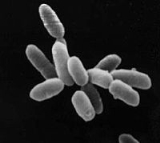
Archaea
Overview
The Archaea are a group of single-celled
microorganism
s. A single individual or species
from this domain
is called an archaeon (sometimes spelled "archeon"). They have no cell nucleus
or any other membrane-bound organelle
s within their cells.
In the past they had been classed with bacteria
as prokaryote
s (or Kingdom Monera
) and named archaebacteria, but this classification is regarded as outdated. In fact, the Archaea have an independent evolutionary history
and show many differences in their biochemistry from other forms of life, and so they are now classified as a separate domain in the three-domain system
.
Unicellular organism
A unicellular organism, also known as a single-celled organism is an organism that consists of only one cell, in contrast to a multicellular organism that consists of multiple cells. Historically simple single celled organisms have sometimes been referred to as monads Prokaryotes, most protists,...
microorganism
Microorganism
A microorganism or microbe is a microscopic organism that comprises either a single cell , cell clusters, or no cell at all...
s. A single individual or species
Species
In biology, a species is one of the basic units of biological classification and a taxonomic rank. A species is often defined as a group of organisms capable of interbreeding and producing fertile offspring. While in many cases this definition is adequate, more precise or differing measures are...
from this domain
Domain (biology)
In biological taxonomy, a domain is the highest taxonomic rank of organisms, higher than a kingdom. According to the three-domain system of Carl Woese, introduced in 1990, the Tree of Life consists of three domains: Archaea, Bacteria and Eukarya...
is called an archaeon (sometimes spelled "archeon"). They have no cell nucleus
Cell nucleus
In cell biology, the nucleus is a membrane-enclosed organelle found in eukaryotic cells. It contains most of the cell's genetic material, organized as multiple long linear DNA molecules in complex with a large variety of proteins, such as histones, to form chromosomes. The genes within these...
or any other membrane-bound organelle
Organelle
In cell biology, an organelle is a specialized subunit within a cell that has a specific function, and is usually separately enclosed within its own lipid bilayer....
s within their cells.
In the past they had been classed with bacteria
Bacteria
Bacteria are a large domain of prokaryotic microorganisms. Typically a few micrometres in length, bacteria have a wide range of shapes, ranging from spheres to rods and spirals...
as prokaryote
Prokaryote
The prokaryotes are a group of organisms that lack a cell nucleus , or any other membrane-bound organelles. The organisms that have a cell nucleus are called eukaryotes. Most prokaryotes are unicellular, but a few such as myxobacteria have multicellular stages in their life cycles...
s (or Kingdom Monera
Monera
Monera is a superseded kingdom that contains unicellular organisms without a nucleus , such as bacteria....
) and named archaebacteria, but this classification is regarded as outdated. In fact, the Archaea have an independent evolutionary history
Evolution
Evolution is any change across successive generations in the heritable characteristics of biological populations. Evolutionary processes give rise to diversity at every level of biological organisation, including species, individual organisms and molecules such as DNA and proteins.Life on Earth...
and show many differences in their biochemistry from other forms of life, and so they are now classified as a separate domain in the three-domain system
Three-domain system
The three-domain system is a biological classification introduced by Carl Woese in 1977 that divides cellular life forms into archaea, bacteria, and eukaryote domains. In particular, it emphasizes the separation of prokaryotes into two groups, originally called Eubacteria and Archaebacteria...
.
Unanswered Questions
Discussions

